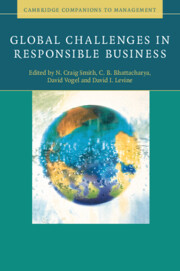Book contents
- Frontmatter
- Contents
- List of figures
- List of tables
- List of contributors
- Foreword
- Introduction: Corporate responsibility and global business
- Part I Embedding corporate responsibility
- Part II Marketing and corporate responsibility
- Part III Corporate responsibility and developing countries
- 8 Stretching corporate social responsibility upstream: improving sustainability in global supply chains
- 9 Breaking new ground: the emerging frontier of CSR in the extractive sector
- 10 Overcoming rural distribution challenges at the bottom of the pyramid
- Index
- References
8 - Stretching corporate social responsibility upstream: improving sustainability in global supply chains
Published online by Cambridge University Press: 05 June 2012
- Frontmatter
- Contents
- List of figures
- List of tables
- List of contributors
- Foreword
- Introduction: Corporate responsibility and global business
- Part I Embedding corporate responsibility
- Part II Marketing and corporate responsibility
- Part III Corporate responsibility and developing countries
- 8 Stretching corporate social responsibility upstream: improving sustainability in global supply chains
- 9 Breaking new ground: the emerging frontier of CSR in the extractive sector
- 10 Overcoming rural distribution challenges at the bottom of the pyramid
- Index
- References
Summary
We, fishers, the lake is all we have to live on. We can make things change if we want to.
(Anonymous fisherman at Lake Victoria)Introduction
While attention for corporate social responsibility (CSR) continues to grow, firms are increasingly being held responsible for practices in their supply chains. In response, firms stretch their CSR programmes, which traditionally have focused on their internal activities, to include the activities of their suppliers. The example of Nike's corporate scandal on the use of child labour in its production facilities in developing countries shows that firms may be held responsible not only for the activities that are carried out within the walls of their firm, but also for those taking place in their supply chains. If we adopt a relatively broad definition of CSR, such as the firm's ‘status and activities with respect to its perceived social obligations’, such programmes fall within the domain of CSR activities.
As many companies have international or even global supply chains, the complexity and size of CSR programmes in these supply chains may increase exponentially – especially if they originate from developing countries. These channels have a triangle-shaped structure whose base consists of large numbers of small-scale primary producers that in the end replenish Western processing industries. Unilever, for example, is developing a programme in which it plans to reach out to 300,000 tea farmers in four countries in Asia and Africa to improve the sustainability of its Lipton tea production.
- Type
- Chapter
- Information
- Global Challenges in Responsible Business , pp. 217 - 240Publisher: Cambridge University PressPrint publication year: 2010
References
- 2
- Cited by

